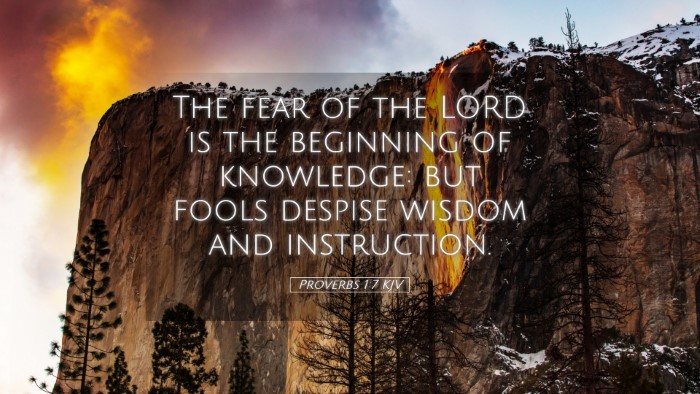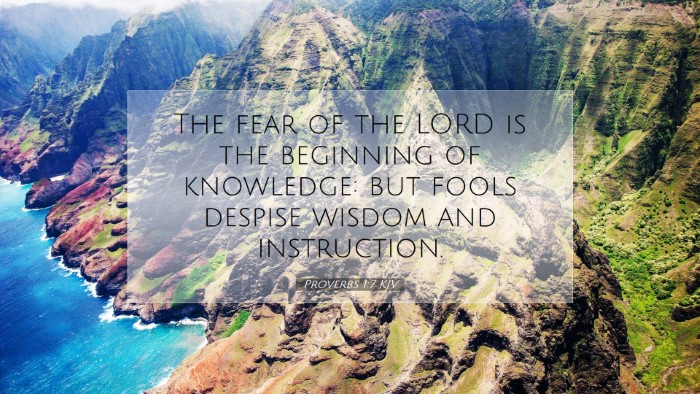Commentary on Proverbs 1:7
Verse: "The fear of the Lord is the beginning of knowledge: but fools despise wisdom and instruction."
Introduction
Proverbs 1:7 stands as a foundational statement in the Book of Proverbs, encapsulating the essence of wisdom and knowledge in relation to the divine. It emphasizes the paramount importance of a proper reverence for God as the starting point for acquiring true understanding. This verse has been deeply pondered by theologians, pastors, and scholars across generations.
Exegesis and Interpretative Insights
The verse begins with the phrase, "The fear of the Lord", which denotes a deep respect, reverence, and awe towards God. This sentiment is not merely the fear of punishment, but an understanding of God's holiness and His authority over all creation.
According to Matthew Henry, the 'fear of the Lord' is a sacred emotion that prompts not only an acknowledgment of God's sovereignty but also leads the believer to trust in Him and follow His commandments.
Albert Barnes observes that this fear is fundamentally linked to worship, asserting that true knowledge cannot exist outside of a relationship with the Divine. He illustrates that such reverence is foundational in establishing moral boundaries and guiding life's decisions.
The Beginning of Knowledge
The second portion of the verse, "is the beginning of knowledge," stresses that all intellectual pursuits and wisdom stem from this foundational fear of the Lord. Knowledge in biblical terms includes not only factual information but also wisdom in living—this is a holistic understanding that encompasses spiritual, ethical, and practical dimensions.
Adam Clarke emphasizes that this knowledge is not merely academic; instead, it is practical and applicable to everyday life. He suggests that a genuine relationship with God alters one’s worldview, making one receptive to divine insight and wisdom.
The Contrast of Fools
The phrase "but fools despise wisdom and instruction" serves as a stark contrast to the righteous. This highlights the attitude of those who reject the overarching importance of divine understanding. Matthew Henry teaches that those who are termed 'fools' are not simply those lacking intelligence; rather, they exhibit a deliberate choice to disregard wisdom rooted in fear of the Lord.
Albert Barnes notes that this rejection stems from pride and self-sufficiency, where individuals believe they can navigate life without divine guidance. In contrast, a humble heart acknowledges the need for instruction, recognizing that true wisdom encompasses more than human reasoning.
Theological Implications
The implications of this verse extend to various theological domains. It asserts that revelation and divine guidance are essential for understanding both spiritual truths and life's complexities. Adam Clarke articulates that without this foundational fear, all human attempts at knowledge are futile, resembling a house built on sand.
This verse aligns with the overarching biblical narrative that emphasizes God's wisdom, as seen in Job 28:28: "And unto man he said, Behold, the fear of the Lord, that is wisdom; and to depart from evil is understanding." The wisdom literature of Scripture consistently calls believers to embrace a life characterized by reverence towards God.
Practical Applications
The practical applications derived from Proverbs 1:7 are numerous and significant for personal growth and community faith. Here are several key takeaways:
-
Discernment in Wisdom: Believers are challenged to seek knowledge through prayer and communion with God, encouraging spiritual discernment in moral and ethical decisions.
-
Encouraging Instruction: Those in teaching roles—parents, pastors, and educators—are reminded of the importance of instilling a reverence for God as a precursor to learning in their students and children.
-
Humility in Learning: Recognizing the limitations of human wisdom prompts a humble approach to education and knowledge, fostering an attitude of lifelong learning centered on faith.
-
Community Reflection: Churches and Christian communities can benefit from dialogues around the fears and reverences that shape their collective understanding and pursuit of knowledge, encouraging accountability in the journey of faith.
Conclusion
In summary, Proverbs 1:7 equips the believer with a profound truth: the fear of the Lord is not simply the beginning but the very essence of true knowledge and wisdom. It serves as a call to abandon the folly of self-reliance and to pursue a humble, reverent, and instructive relationship with God. By integrating this truth into the fabric of daily life, believers not only enrich their own understanding but also contribute meaningfully to their communities and the world.


